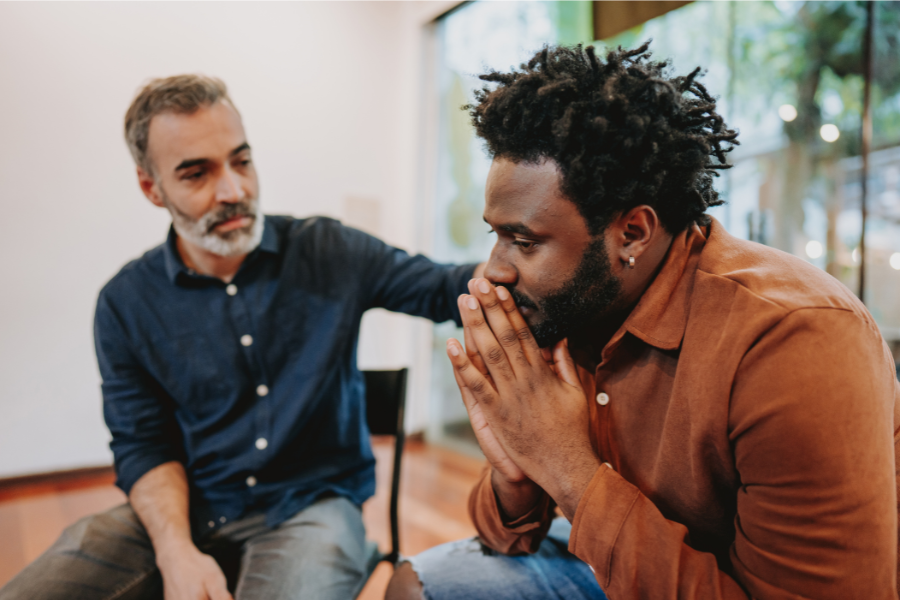Mental Health Strategies for Men
While help-seeking remains a challenge for many men, increasing openness and supportive communities are paving the way for stronger mental health and emotional well-being.

Everyone experiences difficult times in life where stress can become overwhelming and impact our mental health and sense of wellbeing. 1 in 2 Australians will be affected by a mental health condition at some point in their lives and 1 in 5 are affected each year.
A relationship breakdown, losing a job, grieving a loss, homelessness and physical or mental illness are just some of the problems that may affect our mental health and well-being. Other factors such as racial or sexual discrimination, identifying as LGBTIQA+, socio-economic disadvantage and social or geographic isolation can also be associated with an increased risk of experiencing poor mental health. How men and women respond to these situations can be quite different. While the reasons for this can be varied and complex, societal norms tend to teach men to associate getting help and talking about their feelings with being weak. Communities and organisations alike are working hard to change this script.
Men who reach out for help have improved mental health outcomes and are more likely to practice healthier coping strategies.
An important step towards seeking support is noticing the warning signs associated to a change in our mental health and wellbeing. Physical symptoms can be a more obvious sign before recognising your feelings about a situation. Pay attention to how your body is feeling and notice any changes in your physical health, behaviours or emotions and you can begin to recognise and address how you are feeling. Family or friends may also notice things about your wellbeing or behaviour and try to point these out to you and offer support. These can include things like:
- changes in physical appearance
- tiredness; lacking energy or motivation
- feeling down a lot of the time
- increased use of alcohol or drugs
- withdrawing from friends and family; becoming distant
- difficulty sleeping or sleeping all the time
- losing interest in activities that you usually enjoy
- feeling hopeless, or like you’re a “failure” or a burden to others
These can be common reactions to difficult circumstances, but if they continue for a long period of time they can begin to have a negative impact on your physical and mental health. Even when it is difficult to see a way forward, there are a number of strategies you can try to help shift things in a positive direction:
Talk to someone you trust
Sharing what you’re going through can help alleviate your stress and any feelings of aggression or isolation. You may also learn that others have gone through similar experiences and can offer ways of coping that you haven’t thought of. If you don’t feel comfortable talking to anyone you know, there are plenty of other people who can help. Talking to your GP can be a good place to start, as they are someone you may already have a trusted relationship with who can also take your medical history and other considerations into account. A GP can also refer you to a mental health professional or other people or services that can help. There are also a number of ‘non-traditional’ ways that counselling can be provided, such as phone counselling, online and other digital services
Look after your physical health
Eating healthy food, exercising and doing activities that you enjoy can improve how you feel. Exercise is particularly important, as it relieves stress, helps you to sleep better, can connect you with friends and keeps you fit and healthy. Finding a buddy to exercise with or joining a gym or sports club are great ways to get motivated and connect to others.
Reduce intake of alcohol and other drugs
This includes caffeine and nicotine.
Regular consumption of alcohol and drug use can impair your judgment, impact your decision making skills and negatively affect personal and professional relationships. Consider making a plan to gradually reduce your alcohol intake or substance use.
Take small steps
Sometimes when things feel out of control, it can help to come up with some practical ways to manage your situation.
For example, if you are experiencing financial difficulties, you might consider attending a workshop in budgeting, creating a family budget or talking to your bank or financial adviser about ways to better manage your finances. Look at things that you can do, rather than focusing on what is outside of your control.
Connect with others
Catching up with friends and loved ones, or getting involved in your community can help you to stay connected. Join a local group, volunteer or try a new hobby. These are great ways to take your mind off things, meet new people and shift your perspective. Joining a men’s shed can also be a great way to connect with others while working on projects in a safe atmosphere of mateship without any pressure.
Get informed
Find more online supportsLearn more about your mental health by going online, connecting with mental health resources or even speaking to a community mental health service.
There are many great websites that can provide a greater understanding of what you may be going through and offer ways to help you get through tough times.
There are many mental health service providers, support groups and online resources available.
Contact Head to Health on 1800 595 212 to talk to a mental health professional and get connected to the support you need.
For urgent support, call Lifeline on 13 11 14 or SuicideLine on 1300 651 251. If you need immediate help or are at risk of harm to yourself or others, call 000 now.












